Posts Tagged ‘Jane Spender’
PEN Journey 34: Diyarbakir and Beyond—Finding Byways for Peace
PEN International celebrates its Centenary in 2021. I’ve been active in PEN for more than 30 years in various positions and now as an International Vice President Emeritus. With memories stirring and file drawers of documents and correspondence bulging, I am a bit of a walking archive and have been asked by PEN International to write down memories. I hope this personal PEN journey will be of interest.
PEN has always been about building bridges, finding the byways of fellowship among writers whose currency is language and imagination and whose hope is that even with radically different histories and backgrounds, writers might find a way to sit down across a table from each other and share stories and listen to each other and thereby have a beneficent influence on the way they and their societies see themselves and others.
It is an idealistic goal that has been battered in PEN’s hundred year history, and yet the organization continues; the dialogues continue, and writers from over 100 countries continue to meet and talk, even from countries whose governments have not found peace in decades. There have been moments of seeing that optimism realized, at least for a time, and also seeing it smashed.
The next section of these PEN Journeys covering the years 2004 (PEN Journey 33) through 2007 (August) will focus on my years as International Secretary of PEN International. I will travel through events chronologically, the number of events increasing considerably as the role demanded. I will try to knit these together as we continually try to do as an organization.
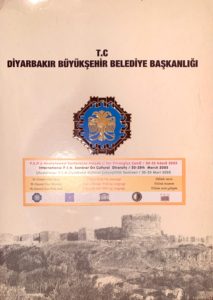
International PEN Seminar on Cultural Diversity in Diyarbakir, Turkey, March 2005
In January, 2005 we held our first board meeting of the year in Vienna where PEN President Jiří Gruša had recently taken up the position as Director of the Diplomatic Academy of Vienna which hosted us. The formal board meeting itself took place in the basement of the hotel restaurant where we were staying. Around the table in the cozy space where we sat on chairs and on a long booth was PEN’s diverse board from Algeria, Colombia, France, USA, Czech Republic, Denmark, Finland, Croatia, Australia, Norway and Japan. The search for an executive director, the new financial and employment systems going into place in the office, an upcoming meeting in Stavanger, Norway with the old Cities of Asylum Network, and an upcoming meeting in Diyarbakir, Turkey with Kurdish and Turkish PEN—all populated the agenda as did the omnipresent discussions on fundraising.
For me, the imminent departure of my Marine son from the combat zone in Iraq hovered in the corner of my mind. We were staying at a pension hotel with small rooms—single bed, dresser and nightstand; I could almost touch the walls on both sides. Outside it was snowing. I’d come to Vienna unprepared for the snow and had bought at a sale a large puffy yellow coat that now draped across the bed for warmth. At night in the dark as I fell asleep, I thought about my son and one night dreamed a desperate dream. Then the phone rang; it was 1:30 in the morning. My husband’s voice woke me. “Wheels are up!” he declared. “They are on their way home!” I still remember the moment, lying there in the dark, snow glistening in the light through the small window and feeling as though the walls had suddenly expanded and a weight lifted that I hadn’t been fully aware I was carrying. The memory…the snow, the Cathedral we passed each day in the square and at dusk in the evening, the puffy yellow coat…
I was wearing that same coat as snow fell later that month in Washington, DC the day my son finally pulled into our driveway. I was sitting on the front porch swing in the snow waiting for him, thinking about the hotel room in the dark, the restaurant basement where we helped craft a conference for writers from the hostile parties in Turkey and another to find sanctuary for writers fleeing oppression—all these memories are wrapped together in a moment of return and of the spirit lifting and life opening a corridor to walk down.
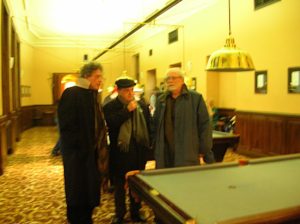
Czech PEN 80th Anniversary in Louvre Cafe where PEN members met in 1925. L to R: Playwright Tom Stoppard, PEN Int’l President Jiří Gruša, Czech PEN President Jiří Stránský.
The next meeting I attended that winter on February 15, 2005 celebrated the 80-year anniversary of Czech PEN. In Prague Jiří and I toasted the endurance of his PEN Center which had been founded by Karel Čapek and 37 Czech writers on that day in 1925. Czech PEN had survived the Second World War, the Cold War, the Soviet occupation and finally the liberation. Former prisoner, playwright and PEN member Václav Havel had become President of the country and his good friend and also prisoner Jiří Gruša was now President of International PEN. Under the auspices of the Minister of Culture, we met with Havel and playwright Tom Stoppard, himself Czech, and Jiří Stránský, President of Czech PEN at the Louvre Café where the original PEN gathering had taken place. Later, the Mayor of Prague hosted a reception with Czech PEN members in the Old Town Hall where he opened an exhibition celebrating “Eighty Years of the Czech PEN Club.”
The following week Writers in Prison Director (WIPC) Sara Whyatt and I traveled to the city of Stavanger, Norway which sat on the sea with a harbor and ships at dock. The Stavanger meeting brought together PEN and members of the now disbanded International Parliament of Writers, an organization founded after the fatwa against Salman Rushdie. The Parliament of Writers had developed a program to house writers in cities of asylum, but the Parliament of Writers no longer functioned. Many of the cities, however, still wanted to continue their hospitality for writers at risk. Stavanger itself hosted writers, including poet and novelist Chenjerai Hove, who’d been president of Zimbabwe PEN until he’d had to flee the government of Robert Mugabe. Hove was a fellow at the House of Culture in Stavanger until he passed away in 2015.
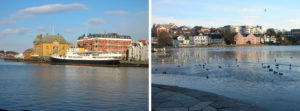
Stavanger, Norway, February, 2005 setting for birth of International Cities of Refuge Network (ICORN)
Helge Lunde, director of the Stavanger International Festival of Literature and Freedom of Speech convened PEN, representatives from the old Parliament of Writers and representatives from some of the cities that wanted to continue the program. In a several day meeting, the outlines of what would become the International Cities of Refuge Network (ICORN) were laid down with PEN as the vetting organization for applications and also a source of hospitality when writers arrived in their new temporary homes. ICORN remains active today in partnership with PEN in over 70 cities which promote and protect freedom of expression and host writers and artists at risk by providing housing, an income, literary arenas, scholarships and grants. PEN’s Writers in Prison Committee and ICORN regularly hold biennial meetings together.
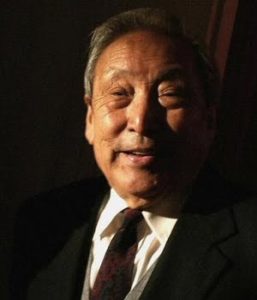
Writer Liu Binyan, a founder and first President, Independent Chinese PEN Center
The following weekend at Princeton University the relatively new Independent Chinese PEN Center (ICPC), founded in 2001, honored Liu Binyan, one of its founders and first President. ICPC’s members live both in China and abroad. The PEN Center gave them the ability to talk with each other and hold programs together, often in Hong Kong. Because of his writing and criticism of the Chinese Communist Party, especially after Tiananmen Square, Liu Binyan had not been allowed to return to China after an academic stay in the U.S. Though he never saw China again, in the U.S. he wrote and worked as Director of Princeton University’s China Initiative. (Nobel Laureate Liu Xiaobo was also a founder of ICPC and its second president.) At the dinner at the Princeton Faculty Club, ICPC members and China scholars presented Liu Binyan the book Living in Exile, written by distinguished essayists in China and abroad and dedicated to Liu who had spent considerable time in detention and in and out of labor camps. Later that year Liu Binyan passed away at his home in New Jersey.
In March “The International PEN Diyarbakir Seminar on Cultural Diversity” convened the largest and most ambitious conference that quarter in the primarily Kurdish southeast of Turkey. For years the Writers in Prison Committee had focused on cases in this dangerous region where fighting between the Kurdistan Workers Party (PKK) and the Turkish military had resulted in multiple imprisonments and killings. However, a rapprochement appeared to be expanding between the government and Kurdish citizens. In this space, PEN International had been working with Kurdish PEN and Turkish PEN to prepare this historic meeting of the two centers, along with PEN’s leadership of the Translation and Linguistic Rights Committee (TLRC). For the first time Kurdish writers and Turkish writers would speak side by side from the same stage in Kurdish and Turkish with translations of each language.
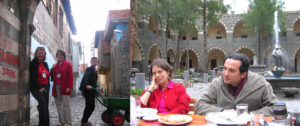
Diyarbakir, Turkey, March 2005. L to R: Joanne Leedom-Ackerman (PEN International Secretary), Jane Spender (PEN International Program Director), Carles Torner (Vice Chair Translation and Linguistic Rights Committee).
My predecessor as International Secretary Terry Carlbom had been instrumental in the planning, and we all agreed he should continue as coordinator of the seminar. Seventy delegates from a dozen countries gathered in the ancient city of Diyarbakir/Ahmed for five days. Diyarbakir dated back at least 5000 years, one of the oldest cities in the ancient land of Mesopotamia between the Tigris and Euphrates Rivers. Later it was dominated by Persia and by Alexander the Great. Because of its strategic position, Diyarbakir’s sovereignty changed many times, was part of the Roman empire, later conquered by the Arabs in 639, by Tamerlane in 1394; the Ottomans conquered in 1515. Diyarbakir continued through cycles of battles for control.
Old Diyarbakir was a standard Roman town circled by a wall, the stones of which still stood. The black basalt wall was said to be second only to the Great Wall of China. Within the walls a labyrinth of cobbled streets and alleyways unfolded, leading to towers where we could see the rivers and gardens and the city’s mosques and street life below, where caravan travelers used to stop on the silk road.
Before the conference began, PEN International Program Director Jane Spender and I explored the twisting paths and shared black tea in a central plaza with Carles Torner, vice chair of the Translation and Linguistic Rights Committee. As an American whose national history extended back barely 400 years, this accumulation of history in the streets and walls and buildings was mind-bending. In stones, in ideas…where did history reside and how did it evolve?
On the first evening Diyarbakir’s Lord Mayor Osman Baydemir greeted us at the Town Hall for a Newroz (New Year’s) reception. I thanked him on behalf of PEN for all he and the city had done to support this seminar. “It is a treat for us to visit one of the world’s oldest cities, with a history that could occupy the imagination of a community of writers like us for years to come,” I said. “Central to the Charter and ethos of PEN is a celebration of the universal which binds us as human beings and of the diversity which distinguishes each individual—the specific history, language and culture. It is our challenge and our aspiration as writers and members of PEN to provide the forums where cultures don’t clash but communicate. That is what we hope to do here in Diyarbakir.”
The first full day of the seminar we spent at the Newroz Festival. Our delegation was seated in an honored place in the bleachers which turned out to be behind the mother of Abdullah Öcalan, one of the founders and leaders of the PKK who was currently in prison. On the grounds in front of us spread thousands/ hundreds of thousands—some said a million people—celebrating the Kurdish new year, a time that coincides with the March equinox. Terry Carlbom and I were soon escorted to the main stage where we stood looking out over a sea of people as far as we could see, many in colorful local dress. Because PEN is specifically a nonpartisan/nonpolitical organization, we felt some ambivalence at the appearance of being swept into the Kurdish cause; on the other hand, the experience was one I won’t forget. The day was celebratory without violence. If there were political speeches, they were not translated for us, and we were accompanied by our Turkish colleagues who also attended.
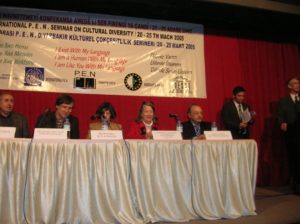
PEN Diyarbakir Conference on Cultural Diversity, 2005. L to R: Mehmed Uzun and Dr. Zaradachet Hajo (Kurdish PEN), Kata Kulavkova, (Chair, PEN Translation and Linguistic Rights Committee), Joanne Leedom-Ackerman, (PEN International Secretary), and Üstün Akmen, Turkish PEN
That evening in opening the conference, I noted, “In Diyarbakir/Ahmed this week we’ve come together to celebrate cultural diversity and explore the translation of literature from one language to another, especially to and from smaller languages. The seminars will focus on cultural diversity and dialogue, cultural diversity and peace, and language, and translation and the future. This progression implies that as one communicates and shares and translates, understanding may result, peace may become more likely and the future more secure.”
The official program began with the Lord Mayor and the President of Kurdish PEN Dr. Zaradachet Hajo and the President of Turkish PEN Mr. Üstün Akmen and a keynote speech by Kurdish author Mehmed Uzun. The following evening Turkish writer Murathan Mungan delivered an introductory address to a public gathering.
At the conference itself Kurdish and Turkish writers, poets, publishers and translators shared history and literature across their linguistic borders. Through discussion and readings and performances, they addressed the importance of cultural diversity as a value in a culture of peace.
Renowned Turkish/Kurdish novelist Yaşar Kemal, former president of Turkish PEN, had been invited but was ill and sent a message instead. He noted that the world was going through a difficult period and was faced with terrible destruction. He asked, “What makes human beings? Love, compassion, peace, friendship…Human beings are the only creative beings in the world.” Local cultures are being destroyed and with that is the destruction of languages and art and values, he said. In life and death we have to stand against a terrible destructive force in favor of local and national culture. “I believe your meeting will be successful,” he predicted.
Kata Kulavkova, Chair of the Translation and Linguistic Rights Committee emphasized the importance of the capacity to imagine, the importance of cultural memory and openness to dialogue. “Europe needs all identities, including Kurdish identities,” she said, noting that every culture is the center of the world for itself. “Turkish and Kurdish culture depend on each other to promote Turkish/Kurdish universal culture.”
Hüseyin Dozen of Kurdish PEN noted that literary translation helps a language to flourish; languages that are not standardized are enriched by literary translation which is an art rather than a scientific discipline. As far as languages that have no official status or have been prohibited, oral literature plays a central role, and the work of a translator must not neglect this kind of literature in his work.
PEN Vice President Lucina Kathmann led a discussion on “Bridging Borders” among women writers. Müge Sökmen of Turkish PEN moderated a discussion on Diversity and Literary Translation; Kurdish PEN member Berivan Dosky moderated a discussion on Cultural Diversity and Peace; Turkish PEN’s Vecdi Sayar led the discussion on Cultural Diversity and Dialogue, and Aysu Erden of Turkish PEN moderated a panel on Cultural Diversity and Linguistic Diversity.
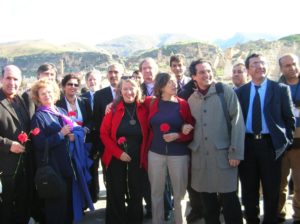
PEN trip to ancient town of Hasenkeyf, Turkey, 2005 including PEN International and Turkish and Kurdish members
One of the highlights of the conference was a visit to Hasankeyf, reputed to be the oldest continuing settlement on the planet and a cradle of civilization. Built into the sandstone cliffs in southeast Turkey, Hasankeyf had yielded relics that dated the site even earlier than the 12,000 years recorded, perhaps as old as 15,000 years. This Kurdish town of southeast Anatolia was threatened by a dam the Turkish government planned to build on the Tigris River. The Ilisu Dam would drown the town as the water was diverted and eventually would submerge Hasankeyf under as much as 400 feet of water.
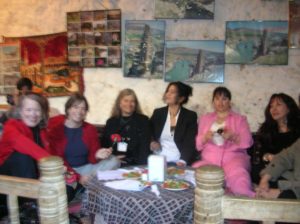
Lunch in a cave in Hasenkeyf, 2005, including PEN International representatives Joanne Leedom-Ackerman, Jane Spender and Lucina Kathmann
As we journeyed up the stone steps to the ruins of Hasankeyf Castle and later as we ate lunch in a cave, then bought small souvenirs from children who lived in the town, our delegation fell in love with the setting and the people. Several of us returned home and began writing about Hasankeyf in an effort to preserve its heritage. We were not alone. Worldwide protests to save this ancient site had been lodged, and the dam had been delayed. I set a google alert so that every time there was mention of the Ilisu Dam, I would know. Lucina Kathmann and I began exchanging latest news.
In spite of worldwide protests, the giant Ilisu Dam was completed after many delays in July, 2019. It began to fill its reservoir, tapping water from the Tigris River and diverting it from Iraq. The rising water levels are now slowly submerging the town of Hasankeyf, flooding the area which had been settled for millennia. The population for the most part has had to move. The waters have risen 15 meters and continue to rise around 15 centimeters per day, according to a February report by Reuters.
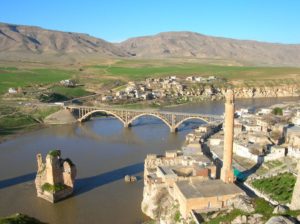
Hasenkeyf, Turkey, March 2005 during PEN Conference on Cultural Diversity, before the Ilisu Dam flooded the region.
Turkey’s rapprochement with the Kurds has also taken a turn away from the opening and the cultural diversity we celebrated in the 2005 Diyarbakir Seminar. But literature was exchanged there; friendships were made, and the dialogue among PEN members continues. Individual by individual has always been the strength and the modus operandi of PEN.
Next Installment: PEN Journey 35: Turkey Again: Global Right to Free Expression
PEN Journey 32: London Headquarters: Coming to Grips
PEN International celebrates its Centenary in 2021. I’ve been active in PEN for more than 30 years in various positions and now as an International Vice President Emeritus. With memories stirring and file drawers of documents and correspondence bulging, I am a bit of a walking archive and have been asked by PEN International to write down memories. I hope this personal PEN journey will be of interest.
PEN is a work in progress. It has always been a work in progress during its 100 years. Governing an organization with centers and members spread across the globe in over 100 countries can be like changing clothes, writing a novel and balancing a complex checkbook all while hang gliding. Perhaps an exaggeration, but not by much.
In 2004 the leadership of President and International Secretary were at the center of the governing structure along with the Treasurer and a relatively new Board. The President represented PEN in international forums. The International Secretary was tasked with overseeing the office and the centers of PEN and with any tasks the President handed over like running board meetings and setting up the agenda for work. The concept was that PEN should be able to elect as President a writer of international stature to represent PEN in global forums but not have the obligation to run the organization. That could be the role of the International Secretary, along with the Board and staff.
When I assumed the role of International Secretary, PEN did not yet have an executive director, though the consensus had built from the strategic planning process that we needed one. Both the President and International Secretary were volunteer, unpaid positions, which meant they were not full time. At the post-Congress board meeting after Tromsø, we agreed to begin a search for an executive director.
I suggested monthly board meetings, which had not been the practice. We could do these by phone, which meant there were only a few hours a day when everyone would be awake. If Judith Rodriguez in Melbourne, Australia could stay up past 11pm and Eric Lax in Los Angeles didn’t mind waking up at 7am, the rest of us—Takeaki Hori in Japan, Sibila Petlevski in Croatia, Eugene Schoulgin in Norway, Elisabeth Nordgren in Finland, Cecilia Balcazar in Colombia as well as President Jiří Gruša when he joined from Vienna or Prague and me in Washington, DC or London—could find our time zone and call in. The technology was not as sophisticated as today, and we didn’t yet use skype so the calls were not cheap, but we began to manage each month.
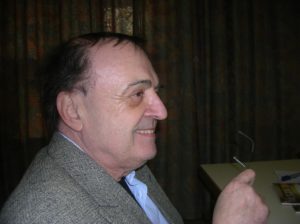
International PEN President Jiří Gruša
As International Secretary, I was in charge of overseeing the office and staff, working with centers on conferences and projects and along with Jiří, liaising with our partners like UNESCO. Administrative Director Jane Spender and I drew up the agenda for each board meeting. I always checked with Jiří to see if he had items to add and to see if he wanted to join the board meeting. I chaired most of the board meetings and much of the Assembly of Delegates at the Congresses. English was not Jiří’s first or second language, and he had other large obligations. During his presidency, he took on the Directorship of the Diplomatic Academy of Vienna, where we held our winter board meetings. This division of tasks between Jiří and me was quite different when the next President John Ralston Saul took on the presidency in 2009, along with Takeaki Hori as International Secretary. John was a much more hands-on President than Jiří. The President and International Secretary were a team and usually agreed between them who would do what.
One of my most important and enjoyable partnerships was with Administrative Director Jane Spender, who was promoted to Program Director for Jane had been instrumental in the thinking and execution of PEN International programs first years. I tried to spend at least a week to 10 days each month in London or on the road for PEN. I was able to finance my travel outside of PEN’s budget. Jane and I worked closely together as we outlined what yet needed to be done in PEN’s move to modernize systems. Each International Secretary had operated in a way that worked for the time. In my tribute to retiring international Secretary Terry Carlbom, I’d noted that early in PEN’s life, around 1924 at a meeting in Vienna, the French representative had turned to the German representative and said, “PEN means Paix Entre Nous (“Peace between us.”).* Members did not always agree with each other and would perhaps even get angry, but the hope was that members would honor and serve that acronym well.
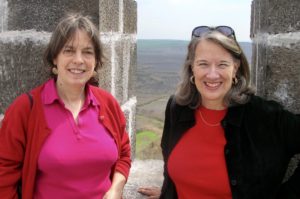
L to R: International PEN Program Director Jane Spender and PEN International Secretary Joanne Leedom-Ackerman at the wall surrounding Diyarbakir, Turkey in March, 2005.
After Terry debriefed me at the PEN Congress in Tromsø, one of my first visits was to Paris to talk with former International Secretary Alexander Blokh, who had held the position for 17 years, to listen to his experience. The times and the demands were changing from Alex’s day as PEN grew and as the world sped up and shrank at the same time with the advent of the internet.
One of my early calls was to George Gawlinski, who had taken PEN through the strategic planning process in Bellagio in 2003 (see PEN Journey 28). George’s advice was that we hire an interim executive director while we did a search for an executive director. He said he happened to know that one of the best in that business was available, a man named Peter Firkin. He could come in, help us get systems in place like employment policies which we didn’t have, a budget which we didn’t have and help set up the systems the office would need to appeal to a first rate executive director and also begin relieving the impossible workload Jane and the staff bore. Jane and I interviewed Peter together. After about twenty minutes (or less), we exchanged relieved glances over the table and knew we had found who we needed for that moment.
A grey-haired New Zealander with wide experience with organizations and a love for books, Peter spoke with the Board and Jiří, and PEN hired him to come in several days a week to begin helping, including assisting in the search process. My notebook of lists had already grown quite full, and now these lists Jane and I allocated among the three of us. One of the big tasks was to develop an overall budget for the organization. The Writers in Prison Committee operated with a budget, but the rest of the organization operated project by project and at the end of the year, a list of expenses and income was recorded. There was not a budget projected forward for the whole organization, rather an accounting of money spent and money received. The only way to draw up PEN’s first budget was to look at what was spent the year before and project forward. The budgeting processes also needed to be set in place. American PEN sent over its financial director to work with the London office for a week with Jane and Peter and the Treasurer Britta Junge Pedersen and bookkeeper Kathy Barazetti. It took a while, but we eventually had a comprehensive, estimated budget for the whole organization.
Another task was to revise our status with the British Charity Commission, which oversaw all charities in Britain. The work of human rights organizations had been regarded as being political in nature, therefore not permitted charitable funds. Some organizations like International PEN had set up charitable trusts—the International PEN Foundation—to raise funds for their educational work. But with a change in the law, human rights organizations were now accepted as a-political. With Peter’s help we found a law firm that could take us through the process to dissolve the International PEN Foundation so International PEN could operate as one charitable organization.
We also found new and highly respected auditors. All these were the nuts and bolts on the continued journey to improve and modernize International PEN. During Terry Carlbom’s tenure as International Secretary, we had gotten rules and regulations and procedures updated and approved and the strategic planning process underway. The tasks and lists to get International PEN operating more efficiently seemed endless, but each day Jane and I checked more items off the lists.
We hired a highly recommended search firm, which Human Rights Watch had used successfully. Jane and Sara made it clear they did not want to be considered for the position of executive director. Jane was made the Program Director and Sara remained the Director of the Writers in Prison Committee. The board set up a committee to oversee the search, to read resumes given us, help set out the tasks and interview questions for finalists and ultimately to interview final candidates. The committee included Eric Lax, Eugene Schoulgin, myself, and Peter Firkin. We consulted closely with Jane and Sara who also interviewed the finalists.
All of this work related to the systems of the organization and were interesting and enjoyable because of the colleagues I was working with even with long hours and sandwiches for dinner at the office. But the most fun was the programs and going out into the world and working with writers. My first trip was to Dakar, Senegal, where one of our oldest African Centers had committed to host the 2007 PEN Congress and was bringing together all the African centers for a conference. One of PEN’s early Vice Presidents had been poet Leopold Senghor, who was also the first President of Senegal. A sentence I wrote and memorized before going there I remember to this day: Il n’a que qelques autre pays dans le monde ou l’ecrivain est plus honore qu’au Senegal. “There are few countries in the world where the writer is more honored than in Senegal.”
In December I left for Jamaica with Canadian PEN’s executive director Isobel Harry. Writers in Jamaica, along with UNESCO’s representative there, wanted to start a PEN Center for the Caribbean.
*P.E.N. acronym stands for Poets Essayists and Novelists; along the way it expanded to Poets Essayist/Editors and Novelists
Next Installment: PEN Journey 33: Senegal and Jamaica: PEN’s Reach to Old and New Centers
PEN Journey 5: PEN in London, Early 1990’s
PEN International celebrates its Centenary in 2021. I’ve been active in PEN for more than 30 years in various positions and now as an International Vice President Emeritus. With memories stirring and file drawers of documents and correspondence bulging, I am a walking archive and have been asked by PEN International to write down memories. I hope this personal PEN journey might be of interest.
I moved to London where International PEN is headquartered in January 1990 from Los Angeles. I came with my husband and my 9 and 11-year old sons who rarely wore long sleeves, let alone coats or jackets. A few weeks into our resettlement, London spun in its first major tornado of the decade with hail and winds whipping at hurricane force and cars and trees toppled and a few rooftops airborne. The weather was highly unusual for London. Our family, who was still in temporary housing, took the unwelcome weather as a welcome of sorts, signaling that we might just be in for an adventure. Did you see that roof flying…!
There were still complaints: only four television channels, movies strictly restricted by age and when you did get into a theater, you had assigned seats, milk that went bad in a day, delivered on the stoop in glass bottles, a refrigerator that barely held enough food for a day, appliances that came without plugs…And where was the sun?
Yet the magic of the city quickly affected us all. My youngest son discovered the best skateboarders lived in London, and London (and England) was full of history and castles, and my oldest son, who was soon moved ahead a grade in school because he was highly talented in math, met students from all over the world in his class at the American School, a few of whom talked and imagined in his orbit. He was put on the rugby team to help socialize and the following year on the wrestling team, where he eventually, as an adult and by then dual citizen, wrestled for Great Britain in the Olympics.
For me, finding home in London meant connecting with PEN, both International PEN and English PEN. Writers can be members of more than one PEN center, though can vote with only one center. I’d begun my PEN journey in Los Angeles at PEN Los Angeles Center (changed to PEN USA West). When my second book was published, I also joined PEN American Center, based in New York, and now in London. I joined English PEN, the oldest and the original PEN center since the organization was founded by British writers in 1921. International PEN and English PEN had separate offices, but the Administrative Secretary of International PEN and the General Secretary of English PEN were longtime friends and actually lived next door to each other in Fulham. The two organizations worked independently, yet closely together.
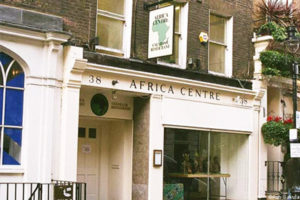
Early on I visited International PEN’s office, headquartered in Covent Garden on King Street in the Africa Centre. To get to the office at the front of the house, you had to go through the Africa Book Shop on the first floor. PEN had two rooms with several desks in the larger room with papers stacked everywhere. There was a filing cabinet and a photocopier and just enough space to squeeze between to get to the desk looking onto the street.
International PEN was kept functioning by the stalwart and efficient Elizabeth Paterson, who I don’t recall getting angry at anyone even as the work piled on and people around the world in PEN centers asked more and more of her, including the smart, demanding International Secretary Alexander Blokh. Alex flew in every month, usually from Paris, and displaced the Writers in Prison Committee’s small staff from the second office in order to conduct the business of PEN around the world. Alex was a former UNESCO official, and at that time UNESCO was one of International PEN’s major funders. When UNESCO was formed, according to Alex, it established organizations for the various arts, but when it came to literature, it recognized that PEN already existed, and so its outreach and funding funneled through PEN. Over the years PEN has grown more and more independent of UNESCO support.
Elizabeth, with her quiet intelligence and subtle humor, managed to keep International PEN running day to day while Alex developed the literary and cultural programs with the centers and the standing committees—the Translation and Linguistic Rights Committee, the Peace Committee, and the Writers in Prison Committee (WiPC). The WiPC tended to operate more autonomously with its elected chair Swedish publisher Thomas von Vegesack and before him Michael Scammell. When I arrived in London, there was also a petite gray-haired woman Kathleen von Simson, a volunteer who’d helped manage the Writers in Prison Committee work for years. PEN had recently hired a paid Coordinator Siobhan Dowd whose task was to professionalize the human rights work, and Siobhan hired researcher Mandy Garner. The two of them worked in the tiny second room. Siobhan eventually crossed the ocean to head up the Freedom to Write program at American PEN.
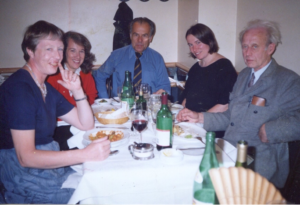
Fall 1990. Left to right: Elizabeth Paterson, Joanne Leedom-Ackerman, Per Wastberg (former PEN International President), Siobhan Dowd, Bill Barazetti
Also finding space on King Street was the Assistant Treasurer (and later International Treasurer) Bill Barazetti, who at that time was an unsung hero from World War II. It was later publicized that Bill had smuggled hundreds of Jewish children out of Prague with false identity papers he arranged. He was a wiry gray-haired former intelligence officer who’d also interrogated captured German pilots. Alex Blokh, whose pen name was Jean Blot, was an exiled Russian Jew, a lawyer and had also been active in the French Resistance during World War II, and Elizabeth had endured the bombings in London during the War. Though it was 1990 and the Berlin Wall and other barriers which had gone up after World War II were now falling, in the PEN office there was still a feeling of that post-War period, an abstemiousness and a fortitude of the dedicated amateur who knew what sacrifice was and endured no matter what. I couldn’t articulate the atmosphere at the time, but as an American born after the war, grown up in Texas and moving to London from Los Angeles, I felt the contrasts and the constraints. One small incident I remember was when a donation for a baby gift for the newly hired Sara Whyatt was being gathered. I offered £20 for the pot and was told by Elizabeth, “Oh, no, that amount would embarrass her.” The concept of anyone being embarrassed by a pooled £20 contribution silenced me. I put in £10 instead, still considered a large amount. Because I was new and an American, I tried to listen and learn, but I understood expectations and horizons were different.
A generation of my own joined the office in the persons of Jane Spender, a former editor, smart and literary who worked with Elizabeth and later Gilly Vincent, who took on the part time assignment to help with development work for the eventual International PEN Foundation. (see PEN Journey 4) Later Gilly became General Secretary of English PEN. I quickly learned to respect the differences; the American way was not the British way. I remember a fundraising event in which there must have been 20 major English writers featured and attending, and the ticket price was £25. The PEN Foundation netted perhaps £3000 that evening. In New York with that line up of writers, I am confident American PEN would have added at least one, if not two, zeros to the proceeds, but we were in London, and the event was not a glittery affair but more like a large family gathering of literary friends at someone’s home.
PEN International moved its offices in 1991 from Covent Garden to Charterhouse Buildings in Clerkenwell nearer the City of London. The new offices were on the top floor of a bonded warehouse, and I never met anyone who didn’t arrive breathless after climbing the steep four or five flights of stairs. There was no elevator, but there was an outside hoist where PEN could load supplies and mail out the window and drop or raise these to and from the ground, preferably not in the rain. Elizabeth set the door code as the beginning and ending years of World Wars I and II, an 8-digit code everyone could remember. The offices at Charterhouse Buildings were spacious compared to King Street—two large airy rooms, one for the Writers in Prison Committee and one for all the other work of PEN, a spacious entry room used as a meeting area and a smaller private office where the International Secretary could work or small meetings could be held. All the rooms were painted “magnolia”–a creamy white/yellow color. The full-time staff by then was, I think, three, along with four or five part-time staff and volunteers, including Jane Spender, Peter Day, editor of PEN International magazine, Bill Barazetti and later his daughter Kathy and occasional interns.
When Siobhan prepared to leave for the U.S., Thomas asked me to interview candidates with him for her replacement. Between interviews he explained to me his view of England in the constellation of Europe by a story of when a fog settled over the English Channel and the headline in a British paper announced: Continent Isolated. Later, when the Channel Tunnel finally connected Great Britain to France in 1994, I sent Thomas a note and a copy of the headline from a British paper: “You’ll be glad to know, Thomas: Continent No Longer Isolated, the headline read.
Thomas and I agreed on the best candidate, and PEN hired Sara Whyatt as the new Program Director of the Writers in Prison Committee. Sara came to PEN from Amnesty and set about further professionalizing WiPC’s research and advocacy work. Sara and Mandy split up the globe, with Mandy focusing on Latin America and Africa.

Across London in Chelsea, English PEN rented offices from the London Sketch Club on Dilke Street where it held weekly literary programs, a monthly formal dinner, an annual Writers Day Program honoring one writer—Arthur Miller, Graham Greene, and Larry McMurtry were three I recall—and a mid-Summer Party. The literary programs and dinners, held in the Sketchers studio and bar, featured writers such as Michael Ignatieff, Germaine Greer, Michael Holroyd, Jan Morris, Rachael Billington, A.L. Barker, Penelope Lively, Andrew Motion, A.S. Byatt, Margaret Foster, William Boyd, Margaret Drabble, Iris Murdoch, and frequently Antonia Fraser, Harold Pinter and Ronald Harwood, just to name a few.
When I moved to London and joined English PEN, the General Secretary Josephine Pullein-Thompson, a stalwart writer/member, managed the organization and kept it running with minimal staff and with active members. Author of young adult novels, Josephine wrote books about young girls and horses. When I close my eyes, I can hear her gruff voice and see her square face and think of horses. She was pragmatic and no-nonsense and what I think of as the epitome of a certain era of British resolve. She befriended me early, I think, because I was focused on a task—getting charitable status for PEN International which ultimately allowed English PEN to claim the same. It was Josephine years later who nominated me as a Vice President of International PEN.
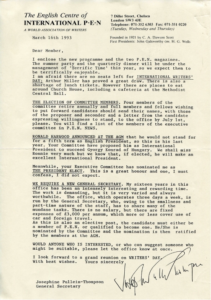
Members of English PEN were passionate about PEN’s mission to protect and speak up on behalf of writers under threat in oppressive regimes. Among activities, members, including notable British writers such as Ronald Harwood, Harold Pinter, and Antonia Fraser, who were good friends, and Moris Farhi, a Turkish/British novelist with a great beard, great girth and great heart, who later succeed me as Writers in Prison Chair, and dozens of other English PEN members held vigils, often by candlelight. They protested outside embassies of countries where writers were in prison. They got press coverage and ultimately helped secure the release of writers, particularly those in former Commonwealth countries like Malawi.
Malawian poet Jack Mapanje recalled his spirit lifting when he saw the press clippings of Harold Pinter and others protesting outside the Malawi Embassy in London on his behalf. When he was released, he resettled in England and joined English PEN.
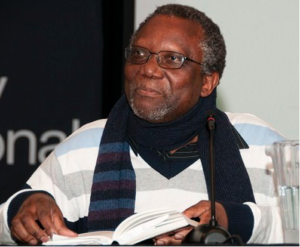
Jack Mapanje
Next Installment: Freedom and Beyond…War on the Horizon